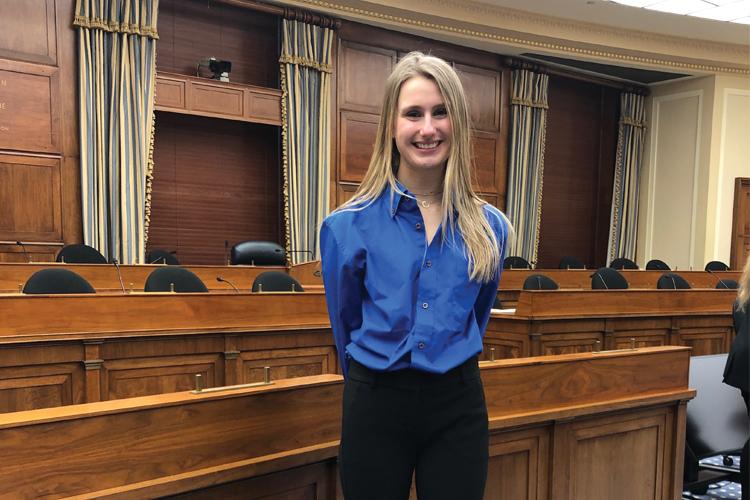//PICTURED ABOVE: Junior Celese Gierhart poses at the United States Senate on her trip to Washington District of Columbia through the Dallas Youth Commission. Through her involvement in the Commission, Gierhart works to advocate for issues that she is passionate about, such as fighting against the Juvenile Curfew Ordinance.
On Feb. 13, when most 17-year-old girls were finishing their homework or wrapping up a sports practice, junior Celese Gierhart, Vice Chair of the Dallas Youth Commission stood before the City Council alongside Dallas citizens to fight against Dallas’ Juvenile Curfew Ordinance at a public hearing hosted at the Dallas City Hall.
The ordinance allows for police to stop, question and cite minors during school hours and late in the night and was initially an attempt to lower crime rates amongst juveniles. At the time, the ordinance was under review by the Dallas City Council after it unexpectedly expired on Jan. 18. After much consideration, however, the City Council voted to renew the curfew, which took effect on March 4.
The juvenile curfew has long had a controversial history with the City Council and Dallas citizens. In the 1990s, the curfew ordinance was welcomed in Dallas, especially in communities such as Oak Cliff where the legislation helped reduce crime rates and violence amongst teenagers. However, the times have changed immensely in the 29 years since it was first enacted, and it came under fire in recent years by activists and organizations pushing to help Dallas teenagers rather than punish them. The tendency for police to heavily target minority teenagers in underprivileged communities adds another layer to the argument against the curfew.
The curfew was introduced to Gierhart after a series of Youth Commission meetings. When she first became involved with the Youth Commission, she applied in the hopes of having input in her community and to further her love for politics. After serving for a year, she has become particularly involved in advocating against the curfew ordinance, as the issue has affected many of her fellow commissioners who represent the various districts around Dallas.
“At our commission meetings, we had a series of speakers come to talk to us, including the Dallas Deputy Police Chief, Judge Williams, and others who really helped me understand the issue at hand and develop my own opinion,” Gierhart said. “I immediately went home and started writing my own position paper. I was shocked by the harsh punishments many Dallas youth were facing that didn’t seem to match their accused crimes.”
The curfew, which was installed in 1991 as a tool to protect the youth of Dallas against criminal behavior and danger, has been renewed every three years by the City Council. With the curfew in place, youth younger than 17 are forbidden from being outside without an adult between 11 p.m. and 6 a.m. Sunday through Thursday nights and between 12:01 a.m. and 6 a.m. Saturday and Sunday. In addition, kids are not allowed to roam the streets between 9 a.m. and 2:30 p.m. on weekdays.
A violation of the ordinance is a Class C misdemeanor that costs up to $500—a fine that many accused struggle to pay off. One of the adjustments made to the curfew ordinance was a reduction of the fine, lowering it to $50, but those fighting to get rid of the curfew want to see the fine and the ordinance gone forever.
“Students ages 10 to 16 are the future of America and should sparingly be saddled with tickets, court time or a criminal record,” Gierhart said. “It is illegal to ticket students for truancy in the state of Texas, but yet they can be ticketed through the curfew ordinance. And getting ticketed with a violation of the curfew means that they not only gain a criminal record, but are also sent to municipal court and fined.”
The ordinance creates an unnecessary touchpoint between vulnerable teens and the police, as the statistics presented at the hearing show that the majority of those indicted live in underprivileged districts with high minority populations. This aspect of the curfew attracted Council Member Philip Kingston to the issue. Kingston, who has represented District 14 in Dallas’ City Council since 2013, hopes to make changes in the way that people are policed in Dallas.
“What the juvenile curfew does is give police the right to investigate children for crimes without any reasonable suspicion to initiate an investigation,” Kingston said. “Everyone else in America has the right for police to prove they have probable cause for investigation before they are charged with a crime. These teenagers do not.”
District 14, which includes Downtown Dallas, Uptown, Historic East Dallas, Turtle Creek and Oak Lawn, is no stranger to police intervention. Especially having represented a district with a large minority population, Kingston wants to see the curfew vanish in the coming years.
“The curfew can impede on police work because it can create [in certain communities], especially in communities of color, a distrust between police and children,” Kingston said. “The way we police in the United States and in Dallas is that the police tend to be in contact with communities of color more than others, as they typically tend to have fewer resources than others.”
With the heavy policing in underprivileged areas, as well as the lack of probable cause necessary for police to ticket teenagers for violating the curfew, Kingston has noticed that the curfew doesn’t do much but prevent particular groups of Dallas teenagers from enjoying their youth, while teens of middle class families can get away with the same things and more.
“Young people in communities of color don’t tend to have places to exist, to enjoy out-of-school time or to practice sports or to take up a hobby,” Kingston observed. “So many of these tickets were written outside apartment complexes in West Dallas where these kids were just trying to live.”
Junior Nirvana Khan is another passionate advocate against the curfew ordinance. Through her work as a community organizer for the local organization Mothers Against Police Brutality, she became aware of the issue at hand. Her involvement with the issue was broadened upon her discovery that only a handful of people in the Hockaday community were even familiar with the curfew. After becoming involved in the cause, she began gathering support from the Hockaday community by spreading awareness for Dallas City Hall public hearings to her fellow peers.
“The problems with it were pretty clear to me off the bat, especially because of the fact that I had never heard of it before, and I’m confident many who go to schools like Hockaday haven’t either,” Khan said. “Talking to teens who live in more underprivileged areas who are affected by it confirmed my thoughts and gave me a whole new perspective.”
Typically, the public hearings hosted by the Dallas City Hall are rarely attended by citizens younger than 20 years old. Therefore, the youth who do attend the hearings, even those serving the Dallas Youth Commission, often feel that it is difficult to make their voices heard while in the presence of council members and influential Dallas figures. However, the fight against the curfew invited a generational takeover to the City Hall as more and more youth began to protest for their rights. Some of the teenage speakers, like Gierhart and Khan, advocated against the curfew seeking change in their community; others brought their personal experiences to the table in order to make their beliefs clear.
“I think that the youth voice in the public hearings has truly made an impact on both the council members and the ordinance itself,” Gierhart said. “The council voted to renew the curfew, but the public’s increased awareness of the issue has been a major step in the need to address the problems with the curfew overall.”
Khan believes that the ability for teenagers to speak up and use their voices to make change has brought a new aura to the City Council, one that she hopes will encourage them to reconsider their decision to renew the curfew. Despite the fact that their efforts were not successful, the adjustments the City Council made to the curfew as a compromise leave the curfew opponents optimistic for the future.
“The tide of public opinion is definitely in our favor, and the people in favor of the ordinance are overwhelmingly from older generations,” Khan noted. “But more and more power is being shifted into the hands of the youth. I think that’s a good sign.”
Story by Shea Duffy
Photo provided by Celese Gierhart









